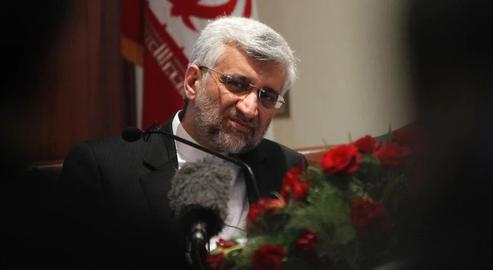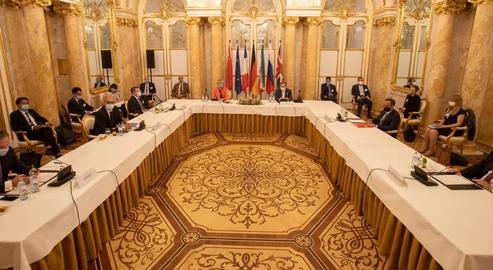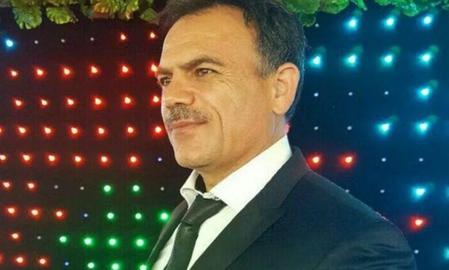Former nuclear negotiator Saeed Jalili has called for Iran to abandon the idea of reviving the nuclear deal, turning against the current lead negotiator and his one-time deputy in an extraordinary letter addressed to the Supreme Leader.
The letter is reported to run to some 200 pages. Though it has not been published in full, Jalili has not denied the parts of it quoted in Iranian media reports. According to Shargh newspaper Jalili said Iran should withdraw from the JCPOA talks completely on the basis that the UN and the IAEA could still veto any new deal: “The efforts of the Europeans and the Americans will not succeed.” He then recommends the Islamic Republic begin enriching uranium to 90 percent purity: “Iran should then enter into direct negotiations with the United States and obtain the necessary concessions.”
Shargh reports that Jalili wrote to the Supreme Leader after failing to solicit the desired response from either Ebrahim Raisi’s foreign minister, Hossein Amir-Abdollahian, or his deputy and current lead negotiator, Ali Bagheri Kani. In the letter, he is understood to have written that the efforts of Bagheri Kani’s team in Vienna were “detrimental” to Iran’s interests and they should be recalled. “It seems that Saeed Jalili intends to build an opposition base to the JCPOA,” Donya-e-Eghtesad wrote. “This letter is the most serious and prominent attack on the course of the JCPOA, Raisi, Amir-Abdollahian and Bagheri [Kani] from within the hardline camp, and it clearly shows that Jalili will not support the revival of the JCPOA by them.”
Division Between Khamenei’s Representatives
Save for one abrupt flight back home in mid-January, Ali Bagheri Kani has spent most of 2022 in the Austrian capital dealing (indirectly) with the US and (directly) the P4+1 on a potential revival of the nuclear deal. He is arguably the most prominent representative of the Raisi administration on the world stage right now. But more importantly, he is acting on behalf of Ayatollah Khamenei.
Jalili and Admiral Ali Shamkhani serve as Khamenei's representatives on the Supreme National Security Council. Shamkhani had previously been optimistic that the JCPOA could be saved by talks in Vienna. But when Hossein Shariatmadari, the editor of Kayhan newspaper, who reports directly to the Supreme Leader, publicly attacked Shamkhani, he backed down.
The rifts between the Leader’s representatives regarding the JCPOA and talks with the United States are profound, and show how difficult it has been for those close to Khamenei to reach a consensus. What they do agree on is that the restrictions imposed by the JCPOA must be lifted.
Given Khamenei's anti-American stance over the past 32 years, his open support for figures such as Shamkhani, who want to reduce tensions with the United States for short-term gains, is difficult to understand. Those close to the Leader who come across as uncompromising and tough, such as Hossein Shariatmadari, are generally seen to be winning the argument.
A Modicum of Independence?
Ali Bagheri Kani is an in-law of the Supreme Leader. His brother, Mesbah al-Hoda Bagheri Kani, is the husband of Hoda, Khamenei's youngest daughter. This family relationship has given him a greater degree of boldness in carrying out his brief, even in the face of opposition from the Supreme Leader’s representative on the Supreme National Security Council.
Bagheri Kani has so far conducted negotiations independently of the Foreign Ministry, where he serves as the political deputy. When he was forced to return to Tehran from Vienna for one-on-one consultations, Foreign Minister Hossein Amir-Abdollahian was out of the country on business. It would appear Bagheri Kani did not feel – had not been made to feel – that face-to-face consultation with the minister would be necessary.
Previously, the Islamic Republic's nuclear negotiations were directed from afar by the Supreme National Security Council and Ali Khamenei. But this time, the National Security Council has been less outspoken on the matter, and it appears that Bagheri Kani and his supporters in Tehran have taken a different approach: relying on personal relationships with influential men in the Office of the Supreme Leader, behind Iran's outward-facing political scene.
Ultimately, though, all of these appointments are symbolic. Ali Khamenei sets the tone for the talks and always has. During Bagheri Kani's unexpected return from Vienna to Tehran, Khamenei, who had previously expressly forbidden any contact with US officials, abruptly stated: "Negotiating with the enemy does not mean surrendering." This effectively gave the green light to Bagheri Kani and his team to deal with their American counterparts, in public or in secret, while reasserting his own dominance over the direction of the talks.
Prior to the JCPOA being signed, Khamenei had also agreed to secret negotiations with US officials being undertaken by Mahmoud Ahmadinejad’s foreign minister. Then-President Ahmadinejad disagreed with the talks taking place, but this made no odds. The opposition of Saeed Jalili, then secretary of the Supreme National Security Council, was similarly disregarded. At that time Hassan Rouhani had been Khamenei’s “representative” on the Supreme National Security Council and by all accounts, he was not briefed about the secret talks either. Officials said that when he found out, Rouhani was shellshocked.
What is the Significance of Saeed Jalili's Letter?
Not only has Ayatollah Khamenei ruled for more than three decades by keeping things secret from Iranian citizens, then, but he has also kept the issues at hand hidden even from his own officials. This is a double-edged sword: each one of his appointees now has their own idea of how the JCPOA talks should progress, and not one is satisfied with the other’s performance.
When decision-making power is not only centralized but concentrated in the hands of one man, it ultimately backfires. The Iranian state is unable to take a unified stand on one of the most fundamental factors to its future survival, and to the lives and livelihoods of the Iranian people. Jalili's letter to Khamenei is a manifestation of this chaotic situation.
Related coverage:
Iranian Deputy's Flight Home Mid-Nuclear Talks: What we Know So Far
Nuclear Talks: Why Saeed Jalili's Successors are Failing to Strike a Deal
Saeed Jalili: Anti-JCPOA Blusterer or Candidate of the 'Justice Seekers'?
Khamenei’s Self-Fulfilling Prophecies are Destroying Iran
Zarif's Farewell Letter to Parliament Reveals Obstacles Blocking a JCPOA Return
Nuclear Acceleration and Rocket Attacks: The Uncertain Future of the JCPOA
Why did Hassan Rouhani Blame Sanctions on 'Disrespect' for the Iranian Constitution?
Nuclear Chief Fears Iran Will be the Next North Korea
The IAEA Nuclear Impasse: Five Questions Tehran Needs to Answer
visit the accountability section
In this section of Iran Wire, you can contact the officials and launch your campaign for various problems


























comments